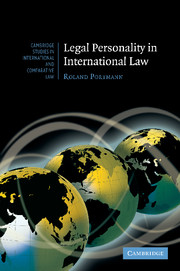Book contents
- Frontmatter
- Contents
- Foreword
- Acknowledgments
- Table of Cases
- List of Abbreviations
- Introduction
- Part I The concept of personality in international law
- Part II The conceptions of personality in international law: their origins and legal manifestations
- Part III A framework for personality in international law
- 10 Appraisal of the conceptions and their assumptions
- 11 An individualistic and formal frame of reference
- Conclusion
- Bibliography
- Index
- Titles in the series
Conclusion
Published online by Cambridge University Press: 05 October 2010
- Frontmatter
- Contents
- Foreword
- Acknowledgments
- Table of Cases
- List of Abbreviations
- Introduction
- Part I The concept of personality in international law
- Part II The conceptions of personality in international law: their origins and legal manifestations
- Part III A framework for personality in international law
- 10 Appraisal of the conceptions and their assumptions
- 11 An individualistic and formal frame of reference
- Conclusion
- Bibliography
- Index
- Titles in the series
Summary
This book argues that there are five conceptions of personality in modern international legal argument. These conceptions consider different entities to be international persons, state different criteria as to how to become one, and attach different consequences to being one. Deliberately, it has not been attempted to examine in depth which of these conceptions find direct support in international doctrine and practice – all of them do to some extent. The present book has rather ventured to engage with the five conceptions by spelling out the original assumptions on which they rest and by examining how they were manifested as well as substantiated in legal practice. The assumptions so derived mainly concern particular views on the nature of statehood, the link between individual freedom and state power, the sources of international law and the relationship between social facts and legal norms. The specific assumptions on these matters could then be related to the respective positions in contemporary international law.
The main insight of this analysis is that conceptions which put overwhelming emphasis on the role of states or effective actors in the international legal system rely on assumptions that have been discarded in present international law: the state is not considered a historical fact, but a legal status; individual freedom is not regarded best preserved inside the state, but by making it a concern for the international community as a whole; international law is not only particular or a mere decision-making process, but includes rules and principles of a general nature; and factual developments do not have direct legal value, but have to be transformed into law through a principled justification.
- Type
- Chapter
- Information
- Legal Personality in International Law , pp. 282 - 283Publisher: Cambridge University PressPrint publication year: 2010

